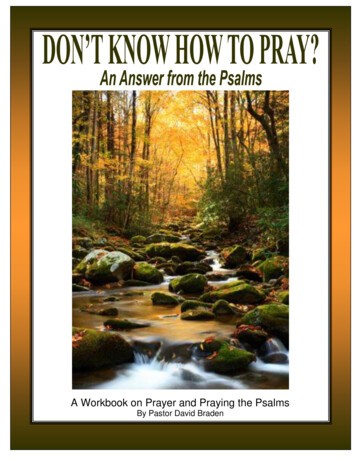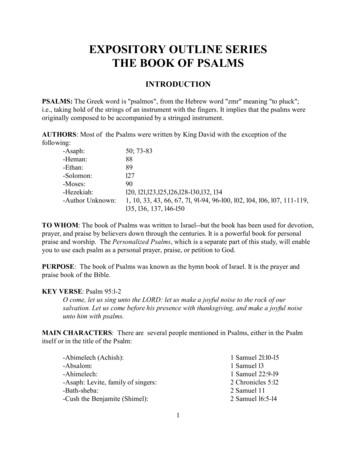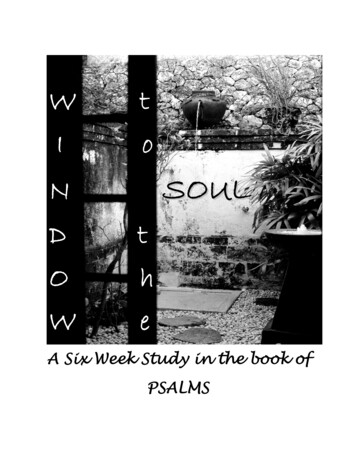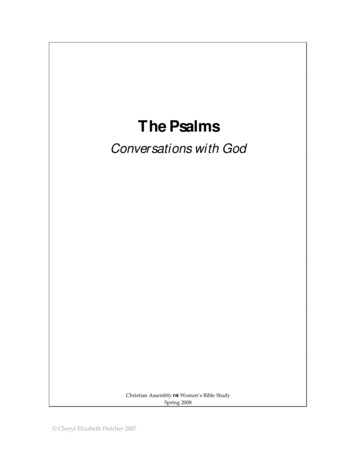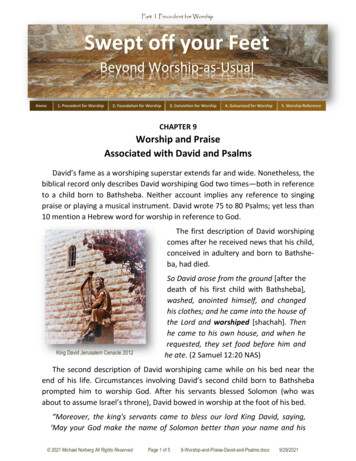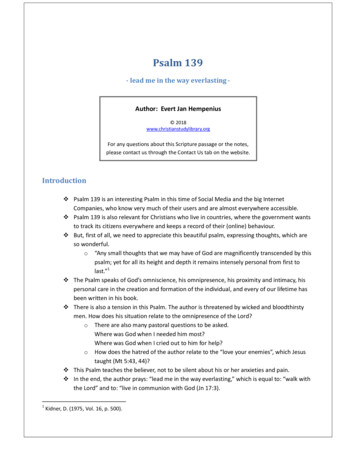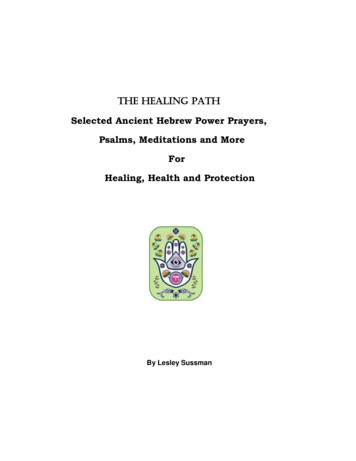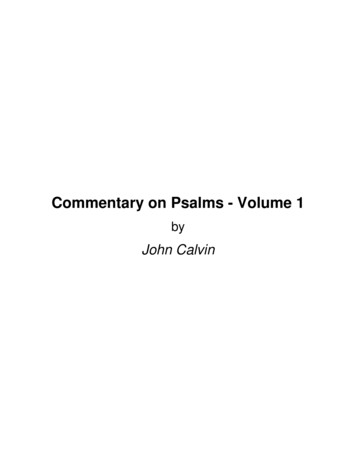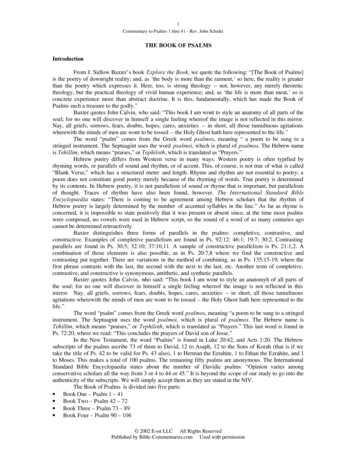
Transcription
1Commentary to Psalms 1 thru 41 - Rev. John SchultzTHE BOOK OF PSALMSIntroductionFrom J. Sidlow Baxter’s book Explore the Book, we quote the following: “[The Book of Psalms]is the poetry of downright reality; and, as ‘the body is more than the raiment,’ so here, the reality is greaterthan the poetry which expresses it. Here, too, is strong theology -- not, however, any merely theoretictheology, but the practical theology of vivid human experience; and, as ‘the life is more than meat,’ so isconcrete experience more than abstract doctrine. It is this, fundamentally, which has made the Book ofPsalms such a treasure to the godly.”Baxter quotes John Calvin, who said: “This book I am wont to style an anatomy of all parts of thesoul; for no one will discover in himself a single feeling whereof the image is not reflected in this mirror.Nay, all griefs, sorrows, fears, doubts, hopes, cares, anxieties -- in short, all those tumultuous agitationswherewith the minds of men are wont to be tossed -- the Holy Ghost hath here represented to the life.”The word “psalm” comes from the Greek word psalmos, meaning “ a poem to be sung to astringed instrument. The Septuagint uses the word psalmoi, which is plural of psalmos. The Hebrew nameis Tehillim, which means “praises,” or Tephiloth, which is translated as “Prayers.”Hebrew poetry differs from Western verse in many ways. Western poetry is often typified byrhyming words, or parallels of sound and rhythm, or of accent. This, of course, is not true of what is called“Blank Verse,” which has a structured meter and length. Rhyme and rhythm are not essential to poetry; apoem does not constitute good poetry merely because of the rhyming of words. True poetry is determinedby its contents. In Hebrew poetry, it is not parallelism of sound or rhyme that is important, but parallelismof thought. Traces of rhythm have also been found, however. The International Standard BibleEncyclopaedia states: “There is coming to be agreement among Hebrew scholars that the rhythm ofHebrew poetry is largely determined by the number of accented syllables in the line.” As far as rhyme isconcerned, it is impossible to state positively that it was present or absent since, at the time most psalmswere composed, no vowels were used in Hebrew script, so the sound of a word of so many centuries agocannot be determined retroactively.Baxter distinguishes three forms of parallels in the psalms: completive, contrastive, andconstructive. Examples of completive parallelism are found in Ps. 92:12; 46:1; 19:7; 30:2. Contrastingparallels are found in Ps. 30:5; 32:10; 37:10,11. A sample of constructive parallelism is Ps. 21:1,2. Acombination of those elements is also possible, as in Ps. 20:7,8 where we find the constructive andcontrasting put together. There are variations in the method of combining, as in Ps. 135:15-19, where thefirst phrase contrasts with the last, the second with the next to the last, etc. Another term of completive,contrastive, and constructive is synonymous, antithetic, and synthetic parallels.Baxter quotes John Calvin, who said: “This book I am wont to style an anatomyh of all parts ofthe soul; for no one will discover in himself a single feeling whereof the image is not reflected in thismirror. Nay, all griefs, sorrows, fears, doubts, hopes, cares, anxieties – in short, all those tumultuousagitations wherewith the minds of men are wont to be tossed – the Holy Ghost hath here represented to thelife.”The word “psalm” comes from the Greek word psalmos, meaning “a poem to be sung to a stringedinstrument. The Septuagint uses the word psalmoi, which is plural of psalmos. The Hebrew name isTehillim, which means “praises,” or Tephiloth, which is translated as “Prayers.” This last word is found inPs. 72:20, where we read: “This concludes the prayers of David son of Jesse.”In the New Testament, the word “Psalms” is found in Luke 20:42, and Acts 1:20. The Hebrewsubscripts of the psalms ascribe 73 of them to David, 12 to Asaph, 12 to the Sons of Korah (that is if wetake the title of Ps. 42 to be valid for Ps. 43 also), 1 to Herman the Ezrahite, 1 to Ethan the Ezrahite, and 1to Moses. This makes a total of 100 psalms. The remaining fifty psalms are anonymous. The InternationalStandard Bible Encyclopaedia states about the number of Davidic psalms: “Opinion varies amongconservative scholars all the way from 3 or 4 to 44 or 45.” It is beyond the scope of our study to go into theauthenticity of the subscripts. We will simply accept them as they are stated in the NIV.The Book of Psalms is divided into five parts: Book One – Psalm 1 – 41 Book Two – Psalm 42 – 72 Book Three – Psalm 73 – 89 Book Four – Psalm 90 – 106 2002 E-sst LLC All Rights ReservedPublished by Bible-Commentaries.com Used with permission
2Commentary to Psalms 1 thru 41 - Rev. John Schultz Book Five – Psalm 107 – 150Some people have seen in this division a parallel with the books of the Pentateuch. The first bookdeals with man, and is mainly from the hand of David. The second book is also, chiefly, attributed to Davidas has as the theme the redemption of man. The third book, with Asaph as its main author, is the Leviticusbook, and is set against the background of the sanctuary. The fourth book opens with the psalm of Mosesand emphasizes the time when all restlessness and wanderings will be finished, and the peoples of the earthwill bow before God and His Messiah. The fifth book is the book of thanksgiving and praise. The emphasisis on the word of God and on God’s faithfulness. 2002 E-sst LLC All Rights ReservedPublished by Bible-Commentaries.com Used with permission
3Commentary to Psalms 1 thru 41 - Rev. John SchultzBOOK ONEPSALMS 1 – 41PSALM ONE1 Blessed is the man who does not walk in the counsel of the wicked or stand in the way of sinners or sitin the seat of mockers.2 But his delight is in the law of the LORD, and on his law he meditates day and night.3 He is like a tree planted by streams of water, which yields its fruit in season and whose leaf does notwither. Whatever he does prospers.4 Not so the wicked! They are like chaff that the wind blows away.5 Therefore the wicked will not stand in the judgment, nor sinners in the assembly of the righteous.6 For the LORD watches over the way of the righteous, but the way of the wicked will perish.The Book of Psalms opens with a beatitude, like the Sermon on the Mount, which our Lordpreached. This is no coincidence, because, not only did Jesus live by the Word of God and make it Hisdaily bread, to the point that His words were laced with quotations from the Old Testament, but the wholeOld Testament also derives its value from the death and resurrection of the Messiah.The exclamation with which the psalm opens, “Blessed!” could be better translated with “O, theblessedness .!” TLB captures this with the rendering: “O, the joys of those .”The word “blessed” has a strong materialistic connotation in the Old Testament. It was expressedin terms of material prosperity, in oil, wine and success. This does not mean that blessedness and prosperityare considered identical. Meaning of the word.In the New Testament blessing is the result of fellowship with God. In this psalm the word blessedhas that meaning.It is remarkable that the Book of Psalms begins with this exclamation. “Blessedness” is the key toopen this hymnal; it is the beginning, the purpose, and the contents of the whole book.It is true that, in a sense, this places man in the center. The Book of Psalms is the humanexpression of the whole spectrum of emotions of fellowship with God. There are prophetic parts in theBook of Psalm, where God speaks to man; but in most of the book man is speaking. It is inconceivable thatman, who rebelled against God, can address God and say something that has meaning. Only redeemed mancan do this. Blessedness is, therefore, the beginning and the basis of most of the psalms.The life of the psalmist is based on blessedness. The exclamation, “O, the blessedness .,”therefore, is not an expression of desire to be blessed, but to maintain the status of being blessed. Thequestion here is not, “how can a man be saved?” but: “how should a redeemed person live?”Two kinds of people are mentioned in this psalm: the man who is saved and who wants to confirmhis salvation, and the man who turns away from salvation and who willfully and purposely rejects thissalvation. Holiness of life begins, in the first place, with the drawing of a line of separation between oneperson and another. This does not mean keeping one’s distance from certain people, but withdrawing fromthe spiritual powers that influence those people. He who has said “Yes” to God has to keep on saying “No”to the devil. This “No” consists in a confrontation between the devil and the Word of God. We shouldnever enter into a dialogue with the enemy and use our own words, but always answer him with the Wordof God. When Jesus was tempted by the devil in the desert, He answered with the words: “It is written ”1The Word of God is the sword of the Spirit.2 That is why a person should have his delight in the law of theLord. Our attitude towards the Word of God is a decisive factor in our sanctification.“Walking in the counsel” speaks about how a man expresses his philosophy of life in his everydayliving. It is living out our faith, or the lack of it. We are what we do. It is impossible to confess with themouth to be a Christian and to follow the customs of people who do not recognize God in their lives.Salvation pertains to our way of life and walking with God means having fellowship with Him. It meanssharing our secrets with Him, and His sharing of His secrets with us. As David says in Psalm 25, “TheLORD confides in those who fear him; he makes his covenant known to them,” or in the rendering of the12Matt. 4:4,7,10Eph. 6:17 2002 E-sst LLC All Rights ReservedPublished by Bible-Commentaries.com Used with permission
4Commentary to Psalms 1 thru 41 - Rev. John SchultzKJV: “The secret of the LORD is with them that fear him; and he will shew them his covenant.”3 This wasthe kind of life Enoch and Noah led. The Bible says about them that they “walked with God.”4 “Thecouncil of the wicked” is the life of a man who goes his own way. This does not necessarily imply atheism.There probably were very few atheists, if any, in David’s time. Anyone, however, who does not trust theLord with all his heart and who does not acknowledge him in all his ways, does not know what salvationand blessedness is.5In our use of language, “to walk” has a connotation of relaxation. The first verse of this psalmissues a warning against a lack of openness and intimacy with God. After our conversion, this walk is thegreatest priority for our spiritual growth. Walking also means progress. A lack of openness and fellowshipwith the Lord means stagnation. This is expressed in the second line of the psalm. If we do not progress inour fellowship with God we find ourselves immediately in the presence of sinners. When one keeps Godout of his life, he becomes automatically a sinner. An act of sin is the result of a broken fellowship. Just asthe presence of the soul in the body keeps the body from decomposing, so the Holy Spirit protects us fromsin. If we do not busy ourselves with the law of the Lord, we stagnate and find ourselves on the road thatwill, eventually, lead to perdition. A man’s acts determine his course in life and our fellowship with God,or the lack of it, determine our acts.A person who sits down has given up in the struggle for advance. A scoffer has turned againstGod. Scoffing is a kind of self-defense. Even the way the sitting of the scoffers is portrayed implies aconspiracy. So is the beatitude of vs. 1 at the same time a warning that the man who separates himself fromGod and His Word, will gradually become worse. Scoffing is a form of entertainment which makes fun ofsomeone. It is a lesser evil if a person shakes his fist at God than it is to mock Him. Scoffing impliessuperiority over the object that is being mocked. The lowest point in the history of man was the mocking ofour Lord Jesus Christ by the Romans and the Jews. The apostle Paul warns us: “Do not be deceived: Godcannot be mocked.”6 A person who mocks God has lost sight of all proportions. He has reached the deepestpoint of stagnation.Over against the fun of the mocker stands the delight of the man who loves the law of the Lord.The poet who wrote this psalm had only the Pentateuch at his disposal, but, obviously, “the law of theLord” stands for the whole of Scripture. Our walk in life is determined by our attitude toward the Bible.That is why it is so important to have a correct understanding about the inspiration and authority of theWord of God. In this psalm, however, much more is at stake than orthodox convictions. The Bible ought tobe our joy of living. We ought to delight in reading it. As a young Christian I went through a struggle inaccepting the Bible as a whole as the Word of God. I was shackled by intellectual and emotionalprejudices. Reading Billy Graham’s testimony tipped the balance for me. It took an act of the will to acceptthis. But even after that, I did not immediately begin with a systematic study of the Bible. The devil seemsto keep his sharpest darts to attack people who have made up their minds to immerse themselves in theWord of God. Sin entered the world with an attack upon the Word of God. I have come to the conclusionthat, if I place myself upon the basis of unconditional acceptance of the Bible as the Word of God, mostintellectual and emotional objections melt away as snow does befor the sun. Another basis would makeobedience to the Word something that goes against the grain of our being. Obedience is founded upon love,and love is fed by the Word of God.Meditating upon the Word suggests memorization. The average Israelite in David’s time was,most likely, illiterate. That fact would make memorization imperative. Our memory suffers from too muchreading. In order to meditate on the law day and night, one would have to know it by heart. Memorizationsaturates us with the Word of God, and this strengthens and deepens our fellowship with the Lord, and itmakes us Christians who can defend themselves against the onslaughts of the enemy. It also deepens ourknowledge of the Word. One can never be finished in his study of the Bible. Texts, phrases, and wordsacquire a richer meaning as we ponder them. The law is not a dead letter but a sharp sword, that penetrateseven to dividing soul and spirit, joints and marrow; it judges the thoughts and attitudes of the heart.7 Paulsays: “Let the word of Christ dwell in you richly.” It will enrich our relationship with our fellowmen (“asyou teach and admonish one another with all wisdom,”) and it will have a positive influence upon our3Ps. 25:14Gen. 5:22; 6:95See Prov. 3:5,66Gal. 6:77Heb. 4:124 2002 E-sst LLC All Rights ReservedPublished by Bible-Commentaries.com Used with permission
5Commentary to Psalms 1 thru 41 - Rev. John Schultzrelationship with God, (“as you sing psalms, hymns and spiritual songs with gratitude in your hearts toGod.”)8 It will give us motivation in what we do: “And whatever you do, whether in word or deed, do it allin the name of the Lord Jesus, giving thanks to God the Father through him.”9 This is the kind of activitythat will cleanse and sanctify our lives. As Jesus said to His disciples: “You are already clean because ofthe word I have spoken to you.”10 And, “Sanctify them by the truth; your word is truth.”11 Oh, theblessedness of the person who meditates on the Word of God!The result of this being saturated with the Word of God has already been examined in the first twoverses in a negative way: it keeps us from sinning and isolates us from the fellowship of sinful men. God’sWord is an antidote against peer pressure. The positive aspect is painted in vs. 3. The keyword in this verseis “success,” “Whatever he does prospers.” The man of God is compared with a tree that grows under idealcircumstances and that reaches its goal in life. It is a beautiful and meaningful image. In reality trees andhumans are completely different from each other; they have very little in common. Trees belong to an olderphase of creation. God made them on the third day. But they are alive as we are and they were made by thesame hand that created us. We have a common origin. The main point of comparison in the image isstability. A tree grows where it is planted. It is impossible to transplant a grown tree. The relationshipbetween a tree and the place where he is planted is constant and permanent. It is mainly this fact thatbecomes a point of comparison between the tree and the Christian in fellowship with God. If we feed uponGod’s Word and become rooted in that Word, our relationship with God will be constant and permanent. Inthat respect, man surpasses all the trees in the world. Trees can be uprooted and fall down, “but he whodoes the will of God abides for ever.”12“He is like a tree.” The man of God is greater than his surrounding; he rises far above the others.We could elaborate greatly upon this comparison, but we will leave it here.Trees are refreshing to men. In Paradise eternal life was presented to the first human couple underthe image of a tree, (and so was death). In the book of Revelation the “Tree of Life” is shown as a symbolof healing. A tree has the ability to take advantage of the situation in which it is placed. Its roots drawnutrition and moisture from the soil and its leaves clear the atmosphere of carbon monoxide and replace itwith oxygen which is needed for all that breathes. And the fruit of a trees feeds man and beast. Trees arethe homes of the birds. A tree is a blessing to its environment, simple because it is there. A tree is exactlywhat God wants it to be. It is also an example of patience for man. Trees grow slowly and sometimes takecenturies to come to full maturity. A tree cannot hurry to produce; it has to wait God’s time. It “yields fruitin season.” As Christians, we ought to take to heart the tree’s example. Bearing fruit takes time and requiresmeeting God’s conditions. The presence of water is important for a tree. Trees do not grow in a desert. Inthe same way the presence of God’s Spirit is of vital importance for man. Without the stream of God’s lifein us, spiritual growth is impossible. It is important for us to know where we are planted. We should learnmany lessons from the tree: what we are is more important than what we do; for a tree it is no extraordinaryachievement to yield fruit; the fruit of a tree is determined by the nature of the tree and by the season of theyear; and if we are what we ought to be, our acts will be the natural outcome of our being.The leaf does not wither. This is a picture of the Christian’s attitude in adversity. A tree knows thesecret of water in a time of drought. One of my missionary friends lost his wife suddenly. His leaf did notwither. “The secret of the LORD is with them that fear him.”13 The Bible assures us that we will succeed ineverything we do. The apostle John shows us how this works. He says: “This is the confidence we have inapproaching God: that if we ask anything according to his will, he hears us. And if we know that he hearsus-- whatever we ask-- we know that we have what we asked of him.”14 If we comply with God’sconditions, He hands us a blank check. Jesus confirms this when He says: “If you remain in me and mywords remain in you, ask whatever you wish, and it will be given you. This is to my Father's glory, that youbear much fruit, showing yourselves to be my disciples.”158Col. 3:16Col. 3:1710John 15:311John 17:1712I John 2:17 (RSV)13Ps. 25:14 (KJV)14I John 5:14,1515John 15:7,89 2002 E-sst LLC All Rights ReservedPublished by Bible-Commentaries.com Used with permission
6Commentary to Psalms 1 thru 41 - Rev. John SchultzThis shows us the importance of human initiative in the Kingdom of Heaven. There is a differencebetween men and trees. “Whatever he does prospers.” Trees don’t do anything. Human enterprise is aunique phenomenon in God’s creation. Even the more developed species of the animals do not achieveanything in the sense that humans do. Man makes plans and executes those plans. Being like a tree seems tocontradict this, and in a way this is true. Man has to surrender to God his right to take initiative and his urgeto achieve, and then only will he prosper. If we say that what we are is more important than what we do, wedo not cancel the need for acting.The psalm ends, as it began, with a reference to the wicked. But here the roles are reversed. In thefirst two verses the righteous man is the point of comparison; in the last three verses it is the wicked.Sinners and righteous are antipodes. “Not so the wicked!” points to extreme positions. There is no greatercontrast in the images used to depict our humanity than a tree and chaff. Spurgeon remarks that chaff existsby the grace of the kernel of wheat. As soon as the wheat is winnowed, the chaff is separated from thewheat kernel and the empty hull has lost its significance. Chaff does not bear fruit; it is useless. Manwithout God has lost his significance. He is a prey to the wind.Every man’s life will be judged. We will all have to stand before the judgment seat of Christ.16 Aman who has lived a life without God will not be able to stand.In the parallel phrase of vs. 5, “the assembly of the righteous” is used as the equivalent of“judgment.” Those who stand on the side of Christ will pronounce judgment upon wicked men and angels.Paul mentions this in his first epistle to the Corinthians. We read: “Do you not know that the saints willjudge the world? And if you are to judge the world, are you not competent to judge trivial cases? Do younot know that we will judge angels? How much more the things of this life!” 17The righteous man has passed judgment already while he was alive on earth. This judgment is thebasis of his justification, and it took place when he crossed over from death to life.18 The people who willbe judged are those who tried to avoid judgment in this life and rejected God’s offer of reconciliation inJesus Christ; those are the one whose knees will buckle when judgment catches up with them.The difference between the righteous and the unrighteous is not always clearly marked on earth.But in life after death there is no place for misunderstanding. Vs. 6 makes clear what the actual differencewas during life on earth. Judgment to come is based on the path one traveled on earth. The two roads arenot clearly marked “the good one” and “the bad one,” although the acts of those who walk on either of theroads are important. They are the road that leads to God or the road that bypasses Him. After all, beinggodless simply means leaving God out of it. Vs. 6 says: “For the LORD watches over the way of therighteous, but the way of the wicked will perish.” The RSV translates this with: “For the LORD knows theway of the righteous, but the way of the wicked will perish.” The Lord knows our way when we know Him.The book of Proverbs advises us: “Trust in the LORD with all your heart and lean not on your ownunderstanding; in all your ways acknowledge him, and he will make your paths straight.”19 Knowing Himmeans acknowledging Him in all our ways, consulting Him about where to go. Therein lies the secret ofperforming good deeds. They are the fruit of asking His guidance and following it. The basis of a rightwalk in life is fellowship with God.The connotation of “the way of the wicked will perish” is that it doesn’t lead to where the peoplethink it will lead. It twists around to the point that it leads nowhere. Nobody in his right mind willpurposely set out to be lost. Everybody hopes that at least something good will come out of it in the end.The ways that bypass God do not lead where the road signs say they will.The psalm ends as it began: with a way to be walked on or not to be walked on. The psalm givesus three formulas if we obey God’s Word:1. God’s Word is a formula against peer pressure (vs. 1,2).2. God’s Word is a formula for success (vs. 3).3. God’s Word is a formula for greatness (vs. 4-6).16II Cor. 5:10I Cor 6:2,318John 5:2419Prov. 3:5-617 2002 E-sst LLC All Rights ReservedPublished by Bible-Commentaries.com Used with permission
7Commentary to Psalms 1 thru 41 - Rev. John SchultzPSALM TWO1 Why do the nations conspire and the peoples plot in vain?2 The kings of the earth take their stand and the rulers gather together against the LORD and againsthis Anointed One.3 “Let us break their chains,” they say, “and throw off their fetters.”4 The One enthroned in heaven laughs; the Lord scoffs at them.5 Then he rebukes them in his anger and terrifies them in his wrath, saying,6 “I have installed my King on Zion, my holy hill.”7 I will proclaim the decree of the LORD: He said to me, “You are my Son; today I have become yourFather.8 Ask of me, and I will make the nations your inheritance, the ends of the earth your possession.9 You will rule them with an iron scepter; you will dash them to pieces like pottery.”10 Therefore, you kings, be wise; be warned, you rulers of the earth.11 Serve the LORD with fear and rejoice with trembling.12 Kiss the Son, lest he be angry and you be destroyed in your way, for his wrath can flare up in amoment. Blessed are all who take refuge in him.The first psalm dealt with the personal, intimate relationship between a man and God. The secondpsalm describes the masses of the world. It paints an international picture of the relationship between theworld and its Creator. The psalm is prophetic in character and very relevant to our present time. What thepsalmist said forty centuries ago, about the time in which he lived, could have been said of all the previousyears since the fall of man into sin, and it applies without any restrictions to the world in the twentiethcentury. And, after I am dead, if not before, it will be fulfilled at the battle of Armageddon.The psalm asks the most important question that can be asked: “Why?” and it is God who asks it.What motivates mankind? Why do they act as they do? The purpose for asking the question is to bring manto reflection. For this reason Jesus stopped Saul of Tarsus in his tracks on his way to Damascus with thepersonal question: “Why?” The answer Paul had to give changed his life.20 Every time God asks thequestion, it is for the same purpose. It is because, in Peter’s words: “[God] is patient with you, not wantinganyone to perish, but everyone to come to repentance.”21 The psalm can, therefore, be interpreted as apeace proposal and an offer of grace.The “why” question is not answered in the psalm; or, at least, not in a direct way. The answer is tobe sought in the direction of death. Death makes all human activity meaningless; that is why man rebels.We shall see that God’s answer to this meaninglessness is in the resurrection of our Lord Jesus Christ.The Adam Clarke’s Commentary, suggests that David probably wrote this psalm in connectionwith the capture of the city of Jerusalem.22 Looking at this historical background through modern eyesgives the psalm a strange character. We know, in recent history, several examples of people who haveconquered other nations in order to protect themselves, and that gives us an uncomfortable feeling when weread what David did with the original inhabitants of Jerusalem. It seems that David denied the Jebusites theright to defend themselves and their city. In twentieth century terms that seems to be an attitude of politicalirresponsibility. It is, therefore, important not to lose sight of the historical context of David’s day. Israel’sconquest of Canaan was part of a divine mandate. The extermination of the Jebusites, however horrible thismay sound to us, was just as much “an act of God” as the Great Flood of Noah’s days. David knew that hehad received the messianic call to forcefully subject nations to his rule. The Jebusites had never beenexterminated. We find them living among the Jews as citizens with equal rights. Proof of this is found inthe report of the plague that threatened Jerusalem. We read then that the angel of the Lord was standing atthe threshing floor of Araunah the Jebusite.23 Later we read that “Solomon began to build the temple of theLORD in Jerusalem on Mount Moriah, where the LORD had appeared to his father David. It was on thethreshing floor of Araunah the Jebusite, the place provided by David.”24 So, the point in question was not20Acts 9:4II Pet. 3:922See II Sam. 5:6-8 and I Chron. 11:4-823II Sam. 24:1624II Chr. 3:121 2002 E-sst LLC All Rights ReservedPublished by Bible-Commentaries.com Used with permission
8Commentary to Psalms 1 thru 41 - Rev. John Schultzextermination but the recognition of David’s reign over these people. It is very difficult for us to judge thesituation of David’s days objectively and justly from our distance in time. We should especially payattention to David’s vision that is demonstrated in this psalm. What he says goes far beyond the conditionsof his own time. He is conscious of the fact that his acts in space and time have eternal value. He sees therelatively unimportant capture of Jerusalem as an image of Armageddon. The hill of Zion, which is hishome, becomes a shadow of God’s holy mountain. David demonstrates his own greatness in his vision, andit is because of it that we now possess this pure piece of poetry. David shows us herein that poetry can bethe purest form of communicating reality.What could be said of David’s time is valid in a much greater measure of our own time. Nobodyreigns anymore by the grace of God. Those who say they do, do so only in name and without any authority.Those in power at present base their government upon the policy of a certain political party and in someinstances upon a majority vote. It is naive to the highest degree to identify democrac
subscripts of the psalms ascribe 73 of them to David, 12 to Asaph, 12 to the Sons of Korah (that is if we take the title of Ps. 42 to be valid for Ps. 43 also), 1 to Herman the Ezrahite, 1 to Ethan the Ezrahite, and 1 to Moses. This makes a total of 100 psalms. The remaining fifty
